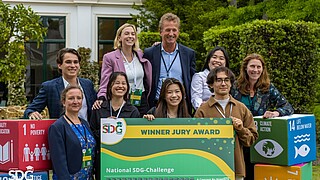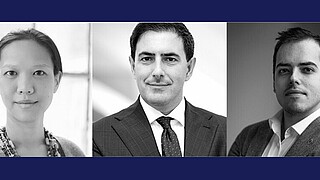RSM alumna Claris Parenti says the European Central Bank selected her and Maren out of 300 candidates for the €10,000 scholarship. Here she tells her story.
What does this scholarship mean to you?
“Growing up in Latin America and witnessing severe environmental damage significantly fuelled my desire to go for a career in the environmental field. Multidisciplinary backgrounds are increasingly valued, especially in business and environmental studies, because of the scale and complexity of grand challenges. There’s a need for collaboration across countries, sectors and backgrounds. My bachelor and master studies at RSM gave me significant knowledge of the business landscape and the issues we are facing towards sustainable development. I want to use my scholarship to specialise more in the environmental field. My academic journey shows that you can study business administration as undergraduate studies, and then opt for science, technology, engineering and mathematics (STEM) subjects for a second master degree to widen your range of skills.”
How did RSM help you on your path to success?
“RSM’s outstanding values, especially the university’s approach to sustainability and integrity in business are exceptional in the business school landscape. The School offers excellent extracurricular opportunities and flexibility to pursue internships and exchange semesters abroad, which gave me the chance to do exchange semesters in Australia and South Korea. Also, RSM’s supportive professors and student advisors genuinely want to bring students’ potentials forward. I learned to never self-select myself out of opportunities before trying. I hope that more women at EUR will apply for this scholarship next year and feel encouraged to follow STEM-related fields. We need more people to study subjects that make a social impact, in line with RSM’s mission to be a force for positive change.”
What were your greatest learnings from RSM?
“The fact that 2 out of the 15 awardees studied at the same university is a great sign of recognition for the high standard of education at Erasmus University Rotterdam. One of my greatest learnings from RSM is being taught a set of values for positive change. This shaped the way I envision my future career. Also, RSM’s research-focused academic rigor and discipline teaches students to take on various projects and quickly build expertise with structured and evidence-based reasoning. My MSc thesis paper A Smart Governance diffusion model for blockchain as an anti-corruption tool in Smart Cities was published in the Journal of Smart Cities and Society, which was a great learning experience and an opportunity to contribute to bridging the persisting academic-practice gap in the field of sustainable development research. Finally, RSM also taught me to challenge the status quo and that systemic issues such as sustainability grand challenges cannot be prevented by identifying and dealing with their causes and mechanisms singularly.”
How do you want to combine your business knowledge with environmental technology?
“RSM taught me about the business case for sustainable development, and now I’m excited to approach environmental studies through scientific knowledge, policy, and engineering to solve environmental problems. I have chosen a specialisation that focuses on circular economy and leverages environmental impact assessment (EIA) tools for the determination of contaminant concentrations and distributions within environmental systems. Bringing together the best of both MSc programmes will hopefully allow me to have expertise in all aspects of sustainable development, and tackle sustainability challenges from scientific, policy, business, and economical standpoints.”
What are your goals for the future?
“Writing my MSc thesis on Latin America showed me the region’s longing for increased international co-operation, targeted investments, conscious governance, and impactful research. Analysing the negative relationship between corruption and a country’s sustainable development further triggered my interest in capital flows, policy, and litigation. Eventually, I aim to continue my studies with a PhD in low-carbon economy and sustainable financial systems. I’m also interested in working for development banks and international organisations such as the UN and the Organisation for Economic Co-operation and Development (OECD). We will see what the future will bring, but I’m very excited at the career prospects that environmental science and business studies are increasingly offering and look forward to starting my career in this field and being an advocate for transformative action.”




